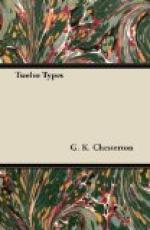Now, this heroic desire to return to nature is, of course, in some respects, rather like the heroic desire of a kitten to return to its own tail. A tail is a simple and beautiful object, rhythmic in curve and soothing in texture; but it is certainly one of the minor but characteristic qualities of a tail that it should hang behind. It is impossible to deny that it would in some degree lose its character if attached to any other part of the anatomy. Now, nature is like a tail in the sense that it is vitally important if it is to discharge its real duty that it should be always behind. To imagine that we can see nature, especially our own nature, face to face is a folly; it is even a blasphemy. It is like the conduct of a cat in some mad fairy-tale, who should set out on his travels with the firm conviction that he would find his tail growing like a tree in the meadows at the end of the world. And the actual effect of the travels of the philosopher in search of nature when seen from the outside looks very like the gyrations of the tail-pursuing kitten, exhibiting much enthusiasm but little dignity, much cry and very little tail. The grandeur of nature is that she is omnipotent and unseen, that she is perhaps ruling us most when we think that she is heeding us least. ‘Thou art a God that hidest Thyself,’ said the Hebrew poet. It may be said with all reverence that it is behind a man’s back that the spirit of nature hides.
It is this consideration that lends a certain air of futility even to all the inspired simplicities and thunderous veracities of Tolstoy. We feel that a man cannot make himself simple merely by warring on complexity; we feel, indeed, in our saner moments that a man cannot make himself simple at all. A self-conscious simplicity may well be far more intrinsically ornate than luxury itself. Indeed, a great deal of the pomp and sumptuousness of the world’s history was simple in the truest sense. It was born of an almost babyish receptiveness; it was the work of men who had eyes to wonder and men who had ears to hear.
’King Solomon brought
merchant men
Because of his
desire
With peacocks, apes and ivory,
From Tarshish
unto Tyre.’
But this proceeding was not a part of the wisdom of Solomon; it was a part of his folly—I had almost said of his innocence. Tolstoy, we feel, would not be content with hurling satire and denunciation at ’Solomon in all his glory.’ With fierce and unimpeachable logic he would go a step further. He would spend days and nights in the meadows stripping the shameless crimson coronals off the lilies of the field.




